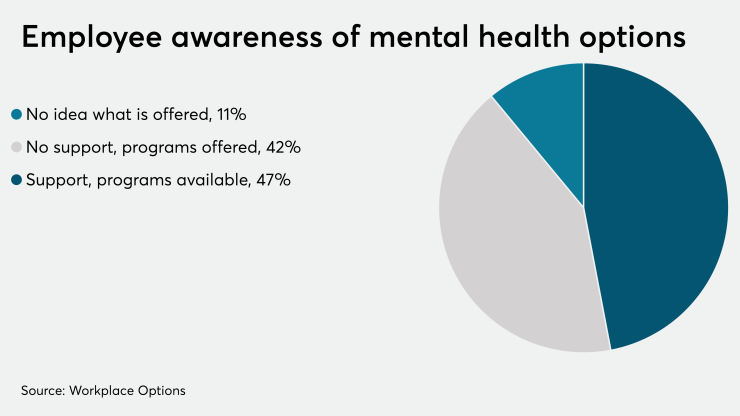WASHINGTON — The statistics are staggering. More than half of U.S. employees struggling with mental health issues do not ever seek treatment — and even if they do, wait an average of 10 years before doing so, according to Jennifer Hunter, CEO of emVitals.
To combat this, in February clinical laboratory Quest Diagnostics launched a pilot program to help 3,000 of its employees get better access to high-quality mental healthcare.
The program — which was introduced in collaboration with Johns Hopkins HealthCare and behavioral health tool emVitals — was meant to reduce stress and improve overall mental health, said Maren Fragala, director of scientific affairs for HealthyQuest at Quest Diagnostics.
“As employers, I think what’s important is for us to realize [is that] unmanaged mental health is not just bad for the well-being of employees, it’s bad for business,” she said Tuesday at the National Alliance of Healthcare Purchaser Coalitions’ Annual Forum.
See also:
Employees who do locate mental healthcare don’t always receive the highest-quality care, said Hunter.
“We talk a lot about mental health stigma in our country, but the truth is we have a lot of internal stigma when it comes to mental health,” she said.
Yet it takes a tremendous toll on employees. Aside from having a direct impact on job performance, poor mental health is a leading factor in workers going on disability and suffering from chronic diseases.
In addition to Quest, a number of employers, including
This week, the National Alliance of Healthcare Purchaser Coalitions
“The level of acceptance around mental health is improving, but the system is getting worse — our access to mental health professionals, psychiatrists and others is getting worse,” said Michael Thompson, president and CEO of the National Alliance, at the conference. “Providers are leaving the system, they are retiring from the system and the new providers are coming in and are being told to practice out-of-network.”
Quest’s approach to its mental health benefits is similar to its physical health benefits — screening employees, identifying who is at risk and then connecting them to care.
After screening its population, the company found that 26% reported having severe stress; 11%, depression; and 16%, anxiety. Almost a quarter of employees reported that stress had affected their health, Fragala said.
“We must help employees understand that risk and manage it,” she said.
See also:
In total, Quest screened about 344 employees for mental health issues. Of that number, 244 (71%) were identified as being moderately or severely at risk in one or more categories such as depression, anxiety, traumatic stress and alcohol use. Of that group, Quest was able to connect 68 employees to mental healthcare.
Workers who are struggling with mental health issues can impact a company’s bottom line in the form of increased absences and increased costs in benefits, like short-term disability. Quest hopes its pilot program will reduce this fallout over time.
“If we can create a caring environment, we can empower employees to check in with their emotional health and we can reduce barriers to care,” Fragala said.






